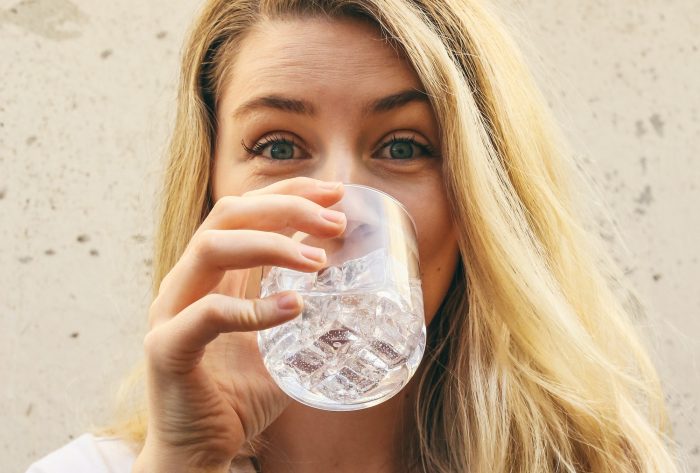This article is written in partnership with Vital Reaction—they’re dedicated to advancing health and human potential with molecular hydrogen, and we’re honored to work with them. ~ ed.
“Take a deep breath,” we often hear when we’re feeling anxious, stressed, or depressed.
So, we take that big gulp of air and let it fill our lungs. And maybe it makes us feel better. Or, maybe it doesn’t. But there’s one thing for sure:
If we live in cities—particularly if we live close to highways and major throughways—that air is a little less helpful to our bodies and minds. In fact, that big, deep breath of polluted air might actually be contributing to our depression, anxiety, and stress (both mental and physical) by 18 to 39 percent (1).
It might sound worrisome that something so automatic and essential to our well-being might be contributing to our degrading mental health. But there’s a gas we can gulp down that’ll actually help us get the healthful balance we seek.
Our friends at Vital Reaction are helping improve mental health and overall potential with molecular hydrogen therapy (no, not hydrogen peroxide), and can help us tip the biological scales of wellness and sanity in our favor. We’ll get to how in a sec. But first, the basics.
Spark this Vital Reaction with 23% OFF using code DETOX & give your body a fighting chance against oxidative stress >>
How the air we breathe could be contributing to our (lack of) mental health.
Simply put, it works like this: there are good guy and bad guy molecules in our bodies.
Free radicals are, generally speaking, the “bad guys.” They tend to wreak havoc on our system and can even damage our DNA. Antioxidants are the good guys—the superhero cells of our bods—and stand up to free radicals.
When the body has too many free radicals and not enough protective antioxidants, the imbalance is called oxidative stress.
Unless you’ve been living beneath a rock, you probably know that oxidative stress is the root cause of most diseases, including cancer, Alzheimer’s, and the aging process in general. Actually, contrary to popular belief, it’s the number one cause of aging and “feeling old”—not your biological age.
But there’s something that you might be even less aware of when it comes to this troublemaker:
Oxidative stress is a major culprit for neural inflammation, which is a common denominator in almost all cases of neurocognitive disorders like anxiety and depression (2). AKA: maybe it’s not you; it’s the oxidative stress—the happiness homewrecker.
When we breathe in pollution, incremental increases in nitrogen dioxide from (mostly) diesel vehicles heighten the risk of common mental disorders by up to almost 40%. Incremental increases in exposure to your standard car’s brake and tire dust increases the same risk by almost 20% (1).
In other words, the more pollution we’re exposed to, the more free radicals we introduce to our bodies. As they accumulate in our bodies and brains, we amp up oxidative stress. Et voilà! There you have it: internal war. Inflammation and oxidative stress build up troops in the brain, contributing to depression (3). It’s like brain pollution. Yuck!
In a world where most of the population lives in areas where particulate matter concentrations are greater than the WHO guidelines (3), the association between air pollution and depression should probably be paid a little more attention. But if our governments won’t do anything about it—because, let’s face it, they haven’t adequately addressed it yet—we can.
That’s where Vital Reaction’s hydrogen therapy comes in.
Give your body’s defense system a little gas.
Studies show that drinking hydrogen-rich water twice daily is beneficial to mood, cognitive performance, and quality of life.
Sip in greater mental health with Vital Reaction. Use code DETOX for 23% off >>
Molecular hydrogen is a unique powerhouse in the way that, like a Bat signal of sorts, it calls on our body’s superheroes to duplicate and make more of its own vigilante antioxidants and anti-inflammatory molecules to fight the good fight for our mental health.
It’s selective about “who” it fights, too. Hydrogen only targets the true free radical criminals in our bodies. That’s important because, just like politicians who actually are fighting to reduce global pollution, not all free radicals are bad. Hydrogen leaves the good guys to do their job effectively, empowering our bodies to fight harder and stronger for our brains and their optimal functioning.
This has got to be woo woo nonsense, right? Wrong!
Sure, while scientists study and test all sorts of weird things, like Loch Ness monster DNA, frozen poop knives, and sounds so loud they vaporize water (all things scientists actually looked into in 2019 [4]), this is not one of those obscure things that lead to dead ends or neutral findings. The success of molecular hydrogen therapy is a bonafide big deal.
The health benefits of molecular hydrogen are so tried and true that many functional and integrative medicine clinics offer this as a service, and more than 10 hospitals across Japan have proved it can help patients who have suffered from cardiac arrests. Even the Japanese Minister of Health, Labour and Welfare received H2 inhalation therapy as an advanced therapy for post-cardiac arrest syndrome (5). Definitely not woo woo.
In fact, over 1,400 peer-reviewed scientific articles have shown molecular hydrogen to have therapeutic potential in treating hundreds of different diseases and trauma scenarios, including neurological diseases, brain trauma, P-TSD, depression, anxiety, and other mood disorders.
Here’s just some of what that means for our brains and mental health:
>> Improved cognitive function
>> Protection from brain degeneration
>> Restored balance to our autonomic nervous system (home of our fight-or-flight stress response)
>> Increased energy & focus
>> Better sleep
That’s because molecular hydrogen is the smallest and most abundant molecule in the Universe, which allows it to penetrate deep into our cells’ mitochondria and nucleus and pummel rogue free radicals. Bam! Pow! Take that!
Because molecular hydrogen can even cross the blood-brain barrier, its effects can be directly infused into each neuron, allowing for its antioxidative effects to help heal the brain like no other antioxidant can. It triggers nicotinamide adenine dinucleotide (NAD), which is a key component in a number of critical cellular processes like DNA repair and immunological functions.
And you only need a tiny bit of it—1.8 parts per million (ppm) of molecular hydrogen in a glass of water will do the trick. FYI: Vital Reaction’s tablets give you 10 ppm in every tablet. Hell yes, 10, baby!
If you really need to pull out the big guns, one hour of treatment using Vital Reaction’s molecular hydrogen inhalation machine is equivalent to taking in 60 molecular hydrogen tablets—which is totally fine, because it isn’t possible to overdose on molecular hydrogen; it just evaporates. Plus, there’s never been a negative side effect reported. Whew! I’m almost feeling better just reading that.
Breathe deep relief with this healing molecular hydrogen inhaler (take 23% off using code DETOX) >>
But what’s it feel like?
A whole lotta nothin’ turns into an interesting somethin’.
As a former Los Angeleno who lived near the port of Los Angeles and the city’s major freeways for a vast majority of my life, I’ve been exposed to more than my fair share of air pollutants, and I’d definitely self-diagnose as having more than my fair share of anxiety and depression.
Many of us who deal with anxiety and depression know that there are good times and bad times. Right now, in my life, it feels as if the F-5 tornado in Twister is swirling around me.
So, do I feel like molecular hydrogen therapy has helped me?
I’d say that a whole lotta nothin’ turned into an interesting somethin’. And that, for me, was a surprise with a capital S!
Now, I’m pretty woo woo, but when I first heard of molecular hydrogen therapy and Vital Reaction’s products, I was skeptical AF. My mind, in fact, was set on its not working.
I was loaded up with almost all of Vital Reaction’s products: their mini molecular hydrogen inhaler, their portable molecular hydrogen water bottle, their molecular hydrogen tablets, and other goodies, too.
I plopped a molecular hydrogen tablet into some purified water and watched it fizz to tiny bubbles in my glass. The first sip tasted perhaps a bit like lemon water. At first, nothing.
I pressed the button on my portable molecular hydrogen water bottle and watched as the basin lit up and tiny bubbles floated from it. It made drinking a fun experience, but again, at first, nothing.
I filled the portable molecular hydrogen inhaler with water, placed the nasal cannula in my nostrils, and powered up the machine. I actually unplugged the nasal cannula to test that there was gas coming out of the attachment. That’s how much nothing I felt when it came to this device. Zilch.
But the longer I sat with the gas undetectably flowing into my nasal passageways, the more I seemed to zero in on my tasks.
As I folded molecular hydrogen water (both with the tablets and from the water bottle) into my daily life, I noticed a subtle increase in focus without the sort of “high” feeling caffeine can bring about. I also noticed signs of detox (fatigue three hours after each bottle for somewhere between three and five days before finally helping to just maintain focus).
And as for that depression and anxiety? Well, let’s put it this way.
While using the molecular hydrogen in its various forms, I noticed that it was easier to remain positive and grounded throughout my days—despite contracting Covid for the first time the same week I learned of some pretty big impending life changes.
The difference felt subtle but also like enough of a good week that I gave myself that pat on the back for the gentle flow and growth I was seeing despite all of this stuff going on that would usually send me into an absolutely frantic survival mode spinout.
It’s when I stopped using the machine for a week and stopped drinking molecular hydrogen that I noticed a downward spiral. So, back to using the inhaler and back to drinking I went!
The best antioxi-dance you’ll ever do with your mental health.
Dealing with our mental health can be a bit of a dance. So, stay on your meds, and don’t stop doin’ whatever you’re doin’ that works for you and any of the mental health woes you might have going on.
We, here at Elephant, aren’t about telling you that something so natural and simple is going to solve all the complex issues going on between your skull. But we can vouch for when something seems worth adding to your already-established regimen.
As skeptical as I was to give this a shot, the science—and now the personal experience—shows that this isn’t just some hocus pocus but a little bit of practical magic in a world where pollution takes its toll on our mental health, and the most abundant molecule in the Universe helps to cleanse our bodies and brains of its damage.
Get your hands on the sorcery of molecular hydrogen healing for 23% off using code DETOX >>
~
Resources:
1. https://www.theguardian.com/environment/2020/oct/24/small-increases-in-air-pollution-linked-to-rise-in-depression-finds-study
2. https://www.vital-reaction.com/blogs/news/traffic-disease-link
3. https://www.ncbi.nlm.nih.gov/pmc/articles/PMC6447209/
4. https://www.livescience.com/weird-studies-from-2019.html
5. https://atm.amegroups.com/article/view/38299/html
 Share on bsky
Share on bsky




Read 2 comments and reply